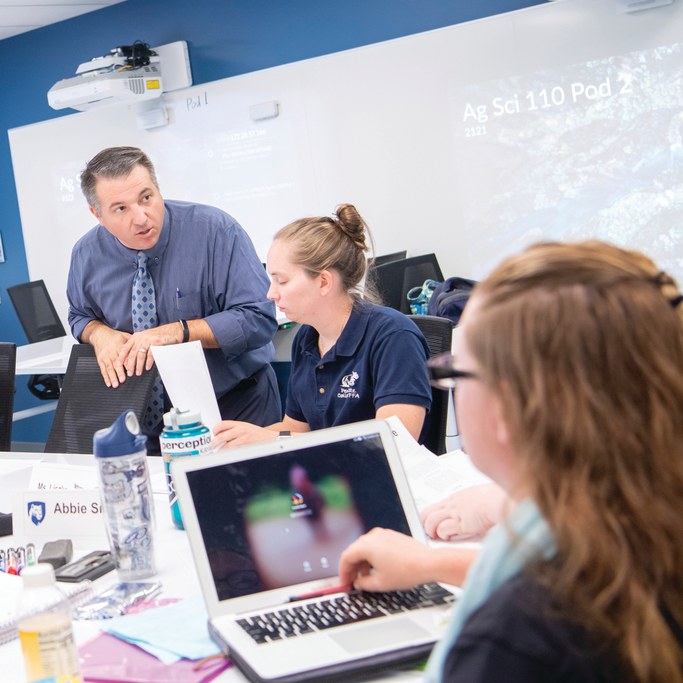Posted: March 2, 2020
The college's Agricultural and Extension Education major is growing the future of education.
From the time he could grip a farm tool, agriculture has been a mainstay in Justin Kurtz's life.
"My stepfather was a farmhand, so I helped him as I was growing up," said Kurtz, who spent his early childhood in Maryland before relocating to Spring Mills with his family. "Whether I was weeding a field on an organic dairy farm in Maryland or stacking hay in central Pennsylvania, I've always been rooted in agriculture."
By way of the agricultural curriculum at State College Area High School, Kurtz furthered his agricultural ambitions, first as an active member of the State College Little Lions Future Farmers of America (FFA) chapter, followed by service as an FFA state officer.
During those years, he came to appreciate the positive influence his teachers had on him and his classmates. "I was intrigued by my teachers' ability to understand where I was coming from and engage my strengths as opposed to my weaknesses," he said. "I came to understand the pivotal role a teacher plays in developing a student, and that had a profound effect on me."
Consequently, as high school graduation neared and it was time to decide on a future career, the choice was easy: he wanted to teach agriculture. "Pairing my love for agriculture and how agricultural education builds students made it a 'no-brainer,'" he said.
Another no-brainer was where he would grow his knowledge and skills. The Agricultural and Extension Education program in Penn State's College of Agricultural Sciences was the place to be "hands down."
Teach Ag! at Penn State
Since 1912, Penn State has been in the business of helping provide the Commonwealth and the nation with highly qualified educators of agriculture, noted Daniel Foster, associate professor of agricultural and extension education.
"If we're going to tackle all the challenges facing our food, fiber, and natural resources, we need to harness the innovation and creativity of young people through inspirational agriscience teachers," he said. "To me, there is nothing more impactful than teacher development. Teachers matter."
Speaking of impact, most of the Commonwealth's secondary agricultural education teachers--approximately 256 educators in more than 150 high schools--are Penn State grown, according to Foster.
"We are the primary driver of agricultural education in Pennsylvania," he said. "Of course, one will also find many of our graduates among the more than 12,000 agricultural teachers in the U.S."
Teach Ag! at Penn State--the exclamation point symbolizes faculty and student enthusiasm for their profession--is housed in the Center for Professional Personnel Development in the Department of Agricultural Economics, Sociology, and Education.
The program has two missions: to prepare future teachers to teach agriculture and serve as FFA advisers in high schools, and to support current secondary agricultural educators through professional development.
As for the first goal, Teach Ag! provides what Foster describes as a "robust" academic curriculum that helps prepare students to be "digitally literate, connected educators who use technology to advance professional growth and student learning."
The aspiring educators are required to accumulate 80 hours of early field experience; 40 of those hours must be with special populations, noted John Ewing, associate professor of agricultural and extension education and undergraduate program coordinator.
"Agriculture teachers must be familiar with the characteristics of learners from various cultural, social, and ethnic backgrounds," he said. "Working with 'age-appropriate' learners promotes an understanding of teaching-learning processes, contributes to sound decision-making about academic and career goals, and helps prepare educators for their work with diverse learners."
Family Atmosphere
From the get-go, students are paired with a faculty mentor who guides their academic journey, connects them with undergraduate research and study-abroad opportunities, and provides information about scholarships and other resources. On Mondays, students can attend a program-wide recitation with peers and faculty members where they compare notes and get and give support, seeing the connections between all the courses taught in the major.
"Beginning as freshmen and throughout their college experience, our faculty are there to help students take advantage of everything that Penn State has to offer," Foster said. "When prospective students say to me, 'I can't go to Penn State--it's too big,' I tell them that the key is finding your tribe. We work hard to create a family environment in which everyone belongs. The Teach Ag! tribe has a place for all."

Myriad student clubs, scholastic teams, honor societies, and organizations, including the LEAD (Literacy, Education, and Agricultural Development) Society and the Penn State Teach Ag! Avengers--a student group that presents programs about teaching agriculture to high schools--can help students build leadership skills and lifelong friendships.
"What I appreciate most about my experience at Penn State is the bond I have with students and faculty," said Kurtz, now a sophomore and a Teach Ag! Avenger. "If I want to pursue an opportunity or passion that will benefit my education or others, the faculty and staff will ensure that I can do so. With that type of support, the sky is the limit."
Darla Romberger, an alumna of the program, echoed Kurtz's point of view. "The experiential learning opportunities outside of the classroom make Penn State's program unique," said Romberger, an agricultural science teacher, FFA adviser, and supervised agricultural experience project mentor in the Cumberland Valley School District in Mechanicsburg.
She continued, "Experiences such as the Domestic Study Away and international study-abroad trips allow pre-service teachers the opportunity to fully understand the impact of an agricultural education program in a community. Additionally, these experiences challenge future teachers to think critically and be prepared to teach in a variety of classroom settings--rural, suburban, or urban."
A Lifetime of Learning
Students nearing graduation can depend on the agricultural and extension education faculty and staff and the college's Office of Experiential Learning and Career Services for résumé help, networking opportunities, and career fairs.
"We have 100 percent placement of our graduates, with approximately 85 percent teaching in a secondary classroom and the remaining 15 percent either entering the industry or moving on to graduate school," said Kevin Curry Jr., assistant professor of agricultural and extension education.
That impressive placement rate, he contends, speaks to "the quality of the candidates, their people skills, and their ability to take complex issues and make them simple. Many of our students and graduates have been recognized nationally for their achievements."
Support does not end upon graduation, as the Center for Professional Personnel Development has an impressive portfolio of workshops, a new and beginning teacher program, and in-service opportunities.
"The program is still very much an integral part of my professional life," said Romberger, who has served as a mentor for agricultural and extension education students and has hosted curriculum workshops at her district. "The faculty model effective instructional strategies and forward thinking, and that encourages me to work hard, to think outside the box, and to dream big."
What is the best part about being a teacher for Romberger? "When a student realizes that agriculture makes an impact in his or her daily life, my day is complete. My profession has lived up to what I expected; I get to inspire kids to understand agriculture, and I get to be a lifelong learner. I also have learned to appreciate all of the behind-the-scenes work and attention to detail that is necessary to maintain a successful agricultural education program."
Global Connections
"Agriculture does not recognize geographic or political boundaries," Foster said. "Recognizing that, we were faced with the challenge of empowering students and current teachers to have the knowledge base and the skill set to work with more diverse classrooms and engage in a globally interconnected world."
With the help of Melanie Miller Foster, global learning specialist and assistant professor of international agriculture in the college's Office of International Programs, Global Teach Ag! at Penn State was born in 2012. The program's first professional development outreach--and now its signature event--is the Global Learning in Agriculture Conference, held annually in February.
The purpose is to develop globally minded agricultural education teachers by providing them with an immersion experience within the context of school-based agricultural education and university agriculture teacher preparation programs.
The conference, delivered online to provide access to academic and industry participants from all over the world, features keynote speakers who discuss advances in agriculture and sustainability on a chosen theme. Last year's event drew 318 participants from 44 states and nine nations to discuss the topic of climate change.
Other programs through Global Teach Ag! include international experiences in Malaysia and Belize, with another planned for May 2020 to Nepal, and the Global Guides program, offered in conjunction with The World Food Prize as a professional development program for teachers in any discipline to integrate food security into their curricula and teaching.
"These are important outreach efforts that help Penn State to partner with educators to affect the global learning of generations of agriculture students at the secondary level," Miller Foster said.
Creating "Rock Stars"
Looking toward the future, Daniel Foster and his colleagues see the program getting bigger and better. The demand for diverse educators to meet the diverse needs related to food, fiber, and natural resources is immense. The program is continually seeking to increase the robust opportunities for specialty areas in agricultural education such as the environmental sciences.
"We're value driven, and we're constantly reflecting on how we can bring these values to life," he said. "Looking at the big picture, we are preparing candidates who are future driven and ready to teach wherever students are in need, not just in their own backyards. We are creating rock stars--positive change agents--who are ready to impact a community one student at a time."
Teach Ag! and Global Teach Ag! are active on Facebook and Twitter @TeachAgPSU and @GlobalTeachAg. For more information about agricultural education or becoming certified to serve as a secondary agriculture teacher and FFA adviser, visit the program website or send an email to TeachAg@psu.edu.
-- Amy Duke
Features
Fostering Forests
Across the United States, forests face unprecedented threats, and scientists in Penn State's College of Agricultural Sciences are conducting novel and complex research to conserve them.
Buzzing With Purpose
Community scientists work to protect Pennsylvania's wild bees
Conservation Reimagined
Exploring new approaches to cope with a changing climate



